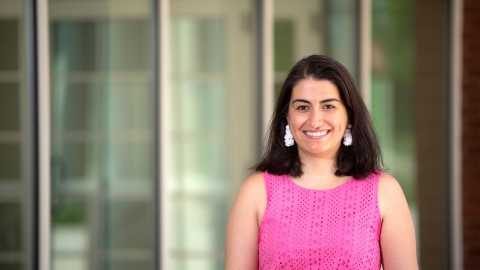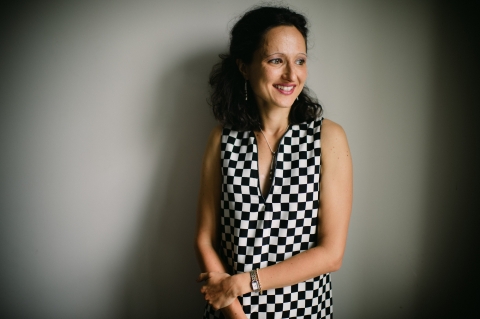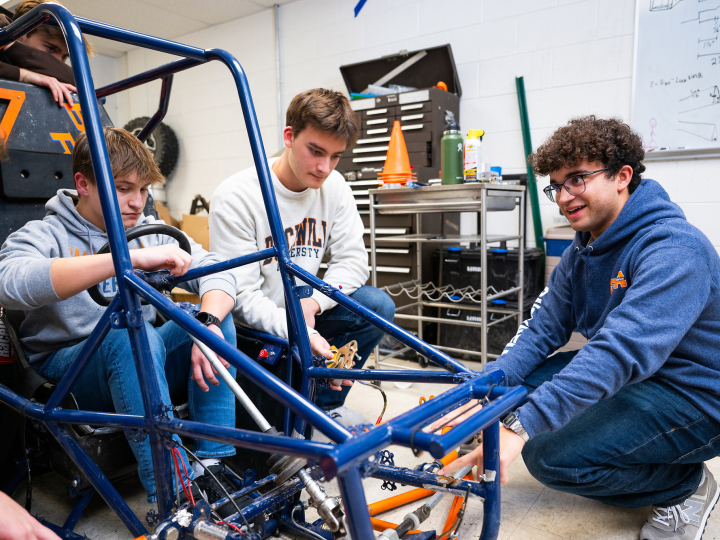
‘A Human Connection’: Bucknell-Geisinger Research Initiative Supports Efforts to More Quickly Diagnose Childhood Infections, Prevent Strokes
June 24, 2020
Professor Amal Kabalan, electrical & computer engineering, will lead a project to develop a rapid test for one of the most common childhood respiratory infections. Photo by Emily Paine, Communications
A few years ago, Professor Amal Kabalan's then four-month-old son came down with an ear infection, placing her in a scenario that's familiar to many parents. A doctor prescribed an antibiotic regimen, but wasn't able to diagnose the cause of the infection, forcing Kabalan to spend several nervous days and nights anxiously watching for changes in her son's condition and trying not to put too much stock in the prognoses of Dr. Google.
As a professor of electrical & computer engineering who studies and develops electronic devices, Kabalan knew there was a better way to more quickly diagnose a condition like this, giving children like her son quicker relief and parents like her peace of mind. This summer, thanks to a partnership between Bucknell and Geisinger, the region's largest health system, Kabalan is in pursuit of that solution — one that could revolutionize the way one of the most common childhood infections is treated nationwide.
Kabalan has teamed up with Dr. Jonathan Sphar, director of pediatric pulmonology at Geisinger, and several Bucknell undergraduates to develop an electrical sensor that could nearly instantly diagnose the bacterial upper respiratory infection M. Catarrhalis, which afflicts 2 to 4 million people each year in the U.S., most of them children.
Their project is supported by a seed grant from the Bucknell-Geisinger Research Initiative, a partnership that fosters collaboration between the two institutions to advance health care delivery, education and research at the local, regional and national levels. Along with a grant to management professors Alia Stanciu and Mihai Banciu, Geisinger doctor Ramin Zand and Geisinger research scientist Vida Abedi, the project is one of two collaborations the program will support this year.
Engineering for a Better World
Kabalan's aim is to develop a device called a biosensor that measures minute changes in electrical resistance to indicate the pathogen's presence or absence. Her first step, starting this summer, will be to create a computer model to help her understand how the bacterium that causes the M. Catarrhalis will affect electrical conductivity. With Sphar's expertise about both the pathogen and the most effective way to collect samples from young patients, she next hopes to build a prototype device to detect the bacterium in the real world, possibly with support from an external grant or funding from Bucknell's Ciffolillo Healthcare Technology Inventors Program.
Kabalan says the concept has been proven by other disease-detecting devices already on the market, as well as many now under development to rapidly test for coronavirus. Like a previous project she worked on to develop solar-powered backpacks to offer students in refugee camps a way to study at night, she was inspired to take on this effort because of its potential to directly help others.
"I choose projects that I am passionate about and that can help humanity in a very broad sense — my purpose is to make things better for people," Kabalan says. "I enjoy working with projects that connect a social element to engineering. I read about a lot of projects that are interesting in their own way, but when I find something that has that human connection, it really clicks."
That same motivation drives Tyler Luong '22, an electrical engineering major from Dorchester, Mass., one of two students who will partner with Kabalan on the project this summer, working remotely until he can return to campus in the fall.
"As an aspiring engineer, I want to use my skills to help better the world, and this is a strong example of that ideology in action," Luong says of the project. "The feeling of working with hardware still fills me with that curiosity and wonder that I felt as a child, and the fact that I'm contributing to making the world a better place for a group of people is even more satisfying."
They'll be joined by Ziqi Qu '21, an electrical engineering major from Shenzhen, China. Qu plans to attend graduate school after Bucknell and says the opportunity to do real, grant-supported research and design work will be a huge boost for his application when he applies.
"My intended research field in graduate school will be nanoelectronics," he says. "I'm excited about this project because it will give me nanoelectronic device research experience before going to graduate school."
A Personalized Approach to Prevention
A third student, finance major Trang Nguyen '21, will take part in the second project supported by the BGRI program starting in the fall, which aims to develop an analytical method for shared decision-making among patients at risk for strokes and other conditions affecting blood flow to the brain. Stanciu, one of the two Bucknell faculty members who initiated the project, says it aims "to understand patients' preferences (and how strong they are) for certain preventive or treatment options in order to avoid or decrease the chance of certain cerebro-vascular incidents such as stroke."

Professor Alia Stanciu, analytics & operations management, is the principal investigator on a BGRI-supported project to improve preventative care for patients at risk of stroke. Photo by Jonathan McBride
"If we understand and quantify these preferences, then the health care provider, together with the patient, can better collaborate and agree on a prevention or treatment plan that incorporates both the medical expertise and the patient's input," says Stanciu, a professor of analytics & operations management who studies health care operations.
Their multidisciplinary team — which also includes Banciu, the associate dean of faculty for the Freeman College of Management; Zand, a stroke specialist; and Abedi, who works to incorporate artificial intelligence and machine learning technologies in medicine at Geisinger — is trying to improve preventive medicine through a personalized approach, which places the project at the nexus of two of the biggest trends in 21st-century health care, Stanciu says.
"Effective interventions to help patients choose and continue practicing a healthier lifestyle require an understanding of their motivations, life goals, opportunities, capabilities, barriers, and social and physical environment," Stanciu says. "Therefore, counseling a patient to change their behavior should be based on the patient's priorities, capabilities and social context. When quantified, that information can help inform the medical provider on choosing the best course of action for the patient. This way, the patients are more inclined to adhere in the long term to the mutually agreed upon plan and improve their medical outcomes."
It's also emblematic of the interdisciplinary approach to research so common at Bucknell, where top scholars from a variety of fields take on the world's most pressing problems, and invite undergraduates into the experience as equal partners.
For Kabalan, who is also aiming to make the world a better place through her engineering research, the opportunity to do that work alongside her students is one of the main reasons she loves teaching at Bucknell.
"I like to work with undergraduate students — the questions I get from a person who is first encountering new technical material provides a perspective that I don't get by reading professional journals or the scientific literature," she says. "I really value that fresh outlook and think it brings a lot of added input to the project."

